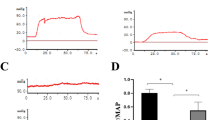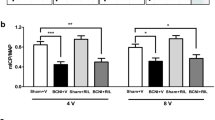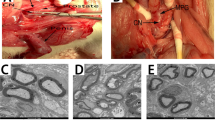Abstract
Trauma to the cavernous nerve is a known cause of erectile dysfunction, with lengthy and often incomplete recovery. Using rat models, we have previously shown that injury to the cavernous nerves or ligation of pudendal arteries causes a significant decrease of neuronal nitric oxide synthase (nNOS) in the dorsal nerve of the penis and intracavernosal tissue as well as loss of erectile response to neurostimulation. Intracavernous injection of vascular endothelial growth factor or brain-derived neurotrophic factor facilitates the recovery of nNOS and erectile function. Studies are underway to elucidate the molecular mechanism of cavernous nerve regeneration and the potential of using growth factors to enhance the recovery of erectile function in patients after radical pelvic surgery.
This is a preview of subscription content, access via your institution
Access options
Subscribe to this journal
Receive 8 print issues and online access
$259.00 per year
only $32.38 per issue
Buy this article
- Purchase on Springer Link
- Instant access to full article PDF
Prices may be subject to local taxes which are calculated during checkout
Similar content being viewed by others
References
Stanford JL et al. Urinary and sexual function after radical prostatectomy for clinically localized prostate cancer: the Prostate Cancer Outcomes Study. JAMA 2000; 283: 354–360.
Cosgaya JM, Chan JR, Shooter EM . The neurotrophin receptor p75NTR as a positive modulator of myelination. Science 2002; 298: 1245–1248.
Ebadi M et al. Neurotrophins and their receptors in nerve injury and repair. Neurochem Int 1997; 30: 347–374.
Snider WD, Zhou FQ, Zhong J, Markus A . Signaling the pathway to regeneration. Neuron 2002; 35: 13–16.
Carmeliet P, Storkebaum E . Vascular and neuronal effects of VEGF in the nervous system: implications for neurological disorders. Semin Cell Dev Biol 2002; 13: 39–53.
Sondell M, Sundler F, Kanje M . Vascular endothelial growth factor is a neurotrophic factor which stimulates axonal outgrowth through the flk-1 receptor. Eur J Neurosci 2000; 12: 4243–4254.
Jung GW, Spencer EM, Lue TF . Growth hormone enhances regeneration of nitric oxide synthase-containing penile nerves after cavernous nerve neurotomy in rats. J Urol 1998; 160: 1899–1904.
Bakircioglu ME et al. The effect of adeno-associated virus mediated brain derived neurotrophic factor in an animal model of neurogenic impotence. J Urol 2001; 165(6 Pt 1): 2103–2109.
Lee MC et al. The effect of vascular endothelial growth factor on a rat model of traumatic arteriogenic erectile dysfunction. J Urol 2002; 167: 761–767.
Lin G et al. Neurotrophic effects of vascular endothelial growth factor and neurotrophins on cultured major pelvic ganglia. BJU Int 2003; 92: 631–635.
Author information
Authors and Affiliations
Corresponding author
Rights and permissions
About this article
Cite this article
Lin, CS., Lue, T. Growth factor therapy and neuronal nitric oxide synthase. Int J Impot Res 16 (Suppl 1), S38–S39 (2004). https://doi.org/10.1038/sj.ijir.3901214
Published:
Issue Date:
DOI: https://doi.org/10.1038/sj.ijir.3901214
Keywords
This article is cited by
-
VEGF genetic polymorphisms affect the responsiveness to sildenafil in clinical and postoperative erectile dysfunction
The Pharmacogenomics Journal (2013)
-
Emerging tools for erectile dysfunction: a role for regenerative medicine
Nature Reviews Urology (2012)



